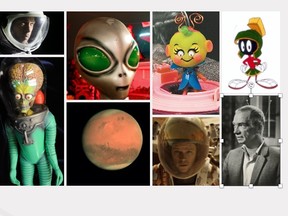

Article content
Earthlings’ fascination with Mars has long been documented. As one of Earth’s neighbouring planets, speculation about what Mars is really like has taken centre stage in many scientific and not-so-scientific conversations. Artists and writers have long used the concept of Martians arriving on earth to entertain us. Just think of Marvin the Martian in Bugs Bunny cartoons, Ray Walston playing Uncle Martin in the 1960s classic My Favorite Martian, or the Martians of Tim Burton’s Mars Attacks!
Advertisement 2
Article content
The list of actors who have travelled to Mars in movies is a long one, including stars such as Brad Pitt and Matt Damon. Expeditions to the Red Planet in film even reach back as far as 1910 in a short called A Trip to Mars. Literature has also reflected a wide range of interpretations about creatures from Mars, whether seen in the Martian invasion in H.G. Wells’ The War of the Worlds or The Martian Chronicles by Ray Bradbury.
Article content

We know now, of course, that there’s no intelligent life forms making their home on Mars. But over the years, speculation ran rampant. Here are just a few of the news stories that the Calgary Herald published over the years about Mars, reflecting — of course — the evolution of what we really know about one of Earth’s closest neighbours.
Aug. 22, 1924 — ‘Flying serpents with huge brains?’
One hundred years ago, this 1924 article in the Herald discussed how advances in photography and telescopes were assisting scientists in learning more about Mars. The canals of the planet had only been discovered 47 years earlier.
“Have people of advanced intellect constructed these ‘canals’ to perpetuate life,” the article questioned. “Do they resemble human beings of the earth . . . Shall we find them to be strange flying serpents with huge brains, or highly developed plants with eyes or real men?”
Article content
Advertisement 3
Article content
The article concluded, “If a race of men is now living on Mars, these beings are unlike man in many respects,” due to the extreme temperatures, reduced sunlight and gravity of the planet. (In modern times, scientists decided the appearance of canals was caused by an optical illusion. Photos from NASA’s Mariner IV showed no sign of canals crossing the surface of the planet.)

Nov. 11, 1926 — Watching the red planet
Long before science and technology allowed for space exploration, earthlings were watching Mars. This space map appeared in a 1926 edition of the Calgary Herald. Users were instructed to hold the map above their heads as a guide to viewing Mars, other planets and the stars.

Aug. 25, 1956 — ‘The orbit of Mars is highly eccentric’
People’s fascination with Mars was reflected in this eight-part series published in the Calgary Herald in 1956. Some of the instalments, such as this one, even started on the front page and included examples of newspaper illustrations popular decades ago. (As a bonus blast from the past, check out the car prices in the adjacent ad: A three-year-old Pontiac 2-Door, complete with “heater and signal lights” was selling for $1,295.)
Advertisement 4
Article content


Sept. 5, 1956 — Does life exist there?
Because Mars was closer to earth than usual in September 1956, it was a big year for news stories about the red planet. By this time, it was generally agreed “if there is some form of intelligent life on Mars it is not probable that they resemble earthlings . . . So Martians, if they do exist, would probably be beings strongly insulated against both heat and cold, fat little fellows.”

Aug. 13, 1969 — Colonizing the red planet: Humankind’s only chance for survival
Humans could be landing on Mars in the 1980s, astronomers predicted in this 1969 article. One astronomer even said, “The only way the human race can survive is to extend the range of man’s habitat to Mars. The sooner that man gets there the better — for his own survival.”
A second astronomer in the article noted, “I can visualize converting the planet from what it is today into something habitable.” A third expert points out that if there are any living organisms on Mars they will be quite different from earth-like forms.

July 5, 1997 — ‘The start of a brave new world exploration’
This series of news stories (the first being a front-page story) celebrated the safe landing of the Pathfinder spacecraft on the surface of Mars in 1997. It led to speculation by scientists that a manned mission to the planet would occur within the next 30 years.


June 2, 2003 — ‘It’s going to look like a NASCAR race to Mars’
With Mars swinging closer to Earth than ever before, scientists were using this opportunity in 2003 to send spacecraft to study the red planet.

Aug. 27, 2003 — ‘People are pretty excited’



* * * * * * * *
Article content